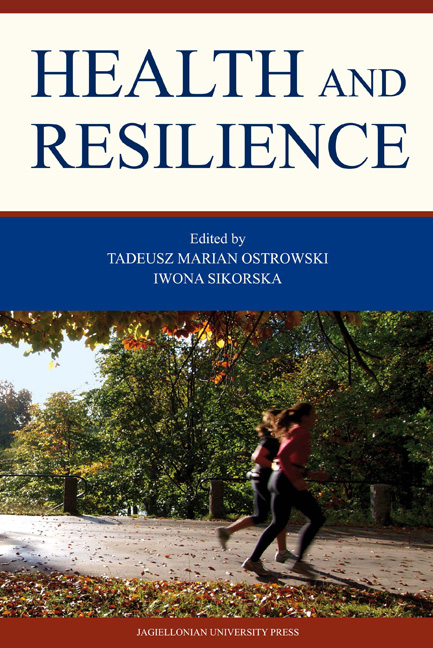Book contents
- Frontmatter
- TABLE OF CONTENTS
- Introduction
- I SOCIAL AND METHODOLOGICAL CONTECTS OF RESILIENCE
- II RESILIENCE IN DEVELOPMENT
- III RESILIENCE AND DISEASE
- Resilience as a chance of developmental success for a child with a chronic illness
- Coping with stress amongst families with children suffering from chronic psychosomatic diseases – recommendations for psychoprophylactic actions
- Styles of coping with negative emotions and stress in patients with hypertension
- Family life dimensions and self-assessment of adolescents and young adults using psychoactive substances – the comparative studies
- List of Authors
Coping with stress amongst families with children suffering from chronic psychosomatic diseases – recommendations for psychoprophylactic actions
from III - RESILIENCE AND DISEASE
Published online by Cambridge University Press: 05 December 2014
- Frontmatter
- TABLE OF CONTENTS
- Introduction
- I SOCIAL AND METHODOLOGICAL CONTECTS OF RESILIENCE
- II RESILIENCE IN DEVELOPMENT
- III RESILIENCE AND DISEASE
- Resilience as a chance of developmental success for a child with a chronic illness
- Coping with stress amongst families with children suffering from chronic psychosomatic diseases – recommendations for psychoprophylactic actions
- Styles of coping with negative emotions and stress in patients with hypertension
- Family life dimensions and self-assessment of adolescents and young adults using psychoactive substances – the comparative studies
- List of Authors
Summary
Abstract
For over fifty years, psychosomatic medicine has been an organized branch of science. The crucial role in psychosomatic disorders is played by emotional factors which elongate the changes in the functioning of the immune and endocrynological systems (Szewczyk, 2001). Prolonged preservation of certain emotions leads to illnesses. Among skin conditions, atopic dermatitis proves to be a growing problem. It is chronically, troublesome and difficult to cure completely and its causes and occurrences is linked with mental conditions (Januszewska, 2001; Nowicki, 2009).
Literary analysis show that the disease occurring within the family system is one of the most acutely working stress stimuli for this family (Hoes, 1997; Plopa, 2004). Research conducted on patients with skin dermatitis (Benea, Muresian, Manolache, Robu, Diaconu, 2001) show health deterioration usually linked with accumulation of stressful events. These patients signalled a feeling of loneliness in the family and being severely punished by their parents. Polish research in this field were mainly conducted on adolescent patients suffering from acne and atopic dermatitis, and who came from families where the bond between the child and parent was too strong and the child's need to subordinate and meet the parent's demand, caused the symptoms of the illness to become more acute. (Tuszynska-Bogucka, 2007).
From the point of view of psychoprophylactic and because of the aforementioned facts, it seems necessary to analyze ways of dealing with stress and correct functioning of the family system where there is a child suffering from psychosomatic diseases.
- Type
- Chapter
- Information
- Health and Resilience , pp. 157 - 168Publisher: Jagiellonian University PressPrint publication year: 2014



